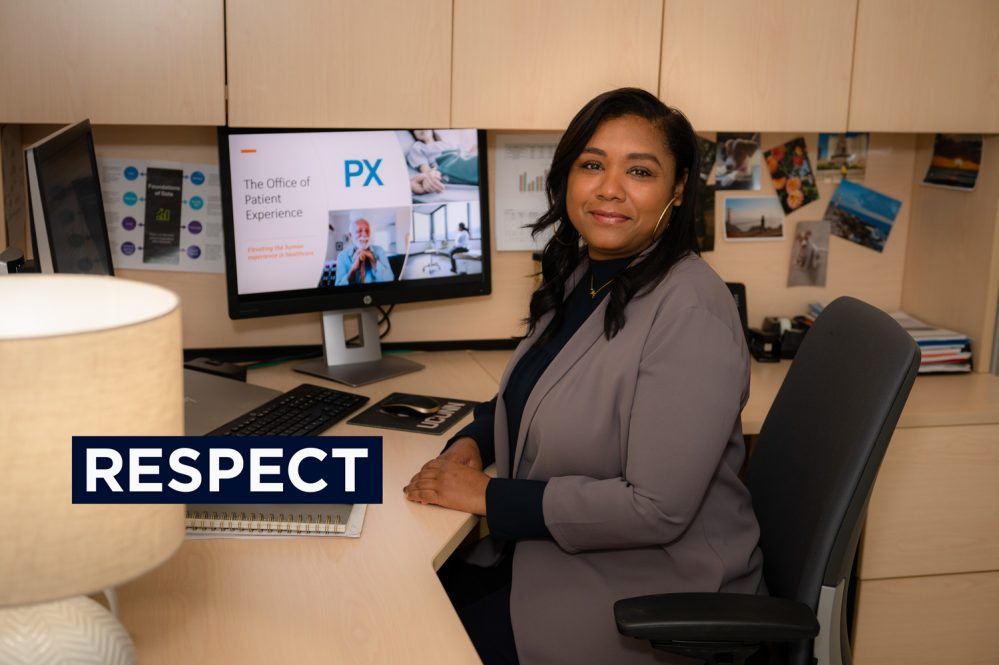It may seem obvious that respect is a critical component of good health care, but Tamara Cardoso is uniquely qualified to understand it.
Cardoso is a performance improvement specialist in UConn Health’s Office of Patient Experience.
“Respect is the foundation of compassionate caregiving, healthy relationship building, and solid teamwork,” Cardoso says. “Respect lives in everything we do as health care professionals. We are humans caring for other humans — this is a hard, unique, and beautiful responsibility.”
Cardoso joined UConn Health as a member of the Epic electronic health record information technology team in 2016. She’s been in patient experience for the last three years.
“The best part of my job is that I can build relationships and positively impact how care is delivered here at UConn Health,” she says. “I have a unique position and an insider’s view of patients’ perception of care, what they need, what they want, and what type of care they expect. And it is my job to listen, share and translate so that our leaders, clinicians, and employees can take meaningful action to elevate the human experience – for all.”
Cardoso’s responsibilities include the role of patient survey administrator, reporting survey data to leadership, providing insightful interpretation and helping identify patient-centric standards and practices.
“The goal is to continue building a supportive environment built on mutual respect, communication, and teamwork, improving patient safety and quality of care.”
Cardoso recalls the importance of respect being instilled on her from her childhood, influenced by her Grandmother, who was born and raised in Georgia.
“I grew up in a Southern household, and at an early age, I learned what respect meant and what it looked like,” she says. “For me, respect is acknowledgment and consideration of another, and it’s about connecting with the individual. Respect allows us to build and preserve relationships with others. This can mean tending to one’s emotions, showing kindness, and demonstrating empathy when someone shows signs of anxiety, discomfort, or even frustration. In health care, demonstrating courtesy and respect enables us to connect as human beings first.”
Cardoso says she and her Office of Patient Experience colleagues exemplify respect by following these tenets:
- Acknowledge everyone with a verbal greeting and a smile.
- Connect with the patient as a human being first, then as a patient.
- Introduce yourself (or your teammate) by name and role.
- Recognize the high-stress/high-anxiety environment of the health care setting and interact with compassion, empathy, and kindness.
- Be attentive to a patient’s and family’s needs and provide updates often, even if you don’t have the answers they are looking for.
- Share information generously and timely.
- Recognize and be mindful of cultural differences, communication needs and preferences, and personal experiences.
- Respect and promote inclusivity and diversity.
- Offer dignity by choosing to see and value others’ needs; advocate for those who are unable to do so for themselves.
“We must honor a shared commitment to providing a mutually respectful environment to support healing for our patients and the communities we serve,” Cardoso says. “Our patients recognize when this is done well.”
Cindy Molin, UConn Health’s vice president for patient experience, is Cardoso’s supervisor.
“Tamara embodies the value of respect – whether giving it, to a patient, a visitor or a colleague, or earning it, from a coworker or an executive leader,” Molin says. “Tamara is a natural leader with the ability to effortlessly strike the balance between being liked and being respected. She is authentic, collaborative, and radiates an abundant positivity that energizes everyone in a room or a meeting.”
Cardoso lives in West Hartford with longtime partner, Stephen, and their dogs, Brooklyn and Dallas. When she’s not working, she enjoys hikes, day trips, and photography.
She says respecting ourselves and others is a small gesture to show others they are cared for and seen, making for small moments that matter to patients, their families and each other.
“I invite everyone to take a moment to recognize and understand that we are humans taking care of other humans — and small gestures of kindness, consideration, compassion, and respect speak volumes — and it will be fondly remembered,” Cardoso says.



